考试专用how to get the poor off our conscience
How to Get the Poor off Our Conscience
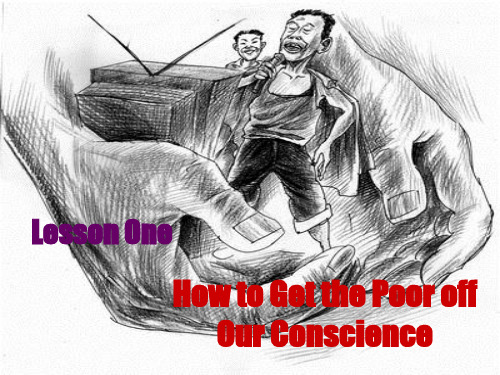
How to Get the Poor off Our Conscience
A Riddle
• No pains, no gains. • What can be got without pains? • Nothing to be got without pains but poverty. • 只有贫穷是可以不劳而获的东西。
Lead-in questions
• 1. Do you think you are poor?
• 2. what makes the fact that you are poor?/who should be responsible for your poverty?
• 3. if you are a billionaire, will you feel guilty about the eБайду номын сангаасistence of the poor people? And how to get it off?
• In the years after the Vietnam War, Ken Galbraith put his energy into writing. In 1996, his book "The Good Society" was published. It was an update of his book "The Affluent Society." He pointed out that the United States had become even more a place for the wealthy, or a "democracy of the fortunate." • • John Kenneth Galbraith receives the Medal of Freedom from President Bill Clinton.
Book 6 How to get the poor off our concience
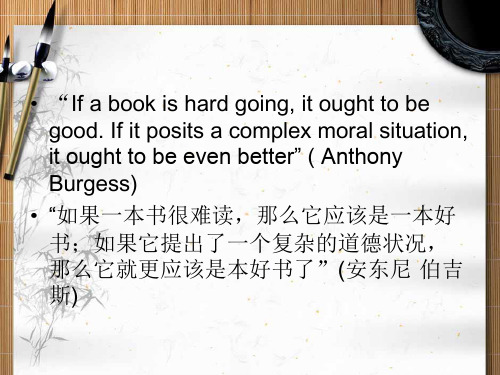
implications from evolution, provided the defenders of laissezfaire capitalism with intellectual foundations that they used to oppose state interference with market forces.
John kenneth Galbraith
One of the most influential of contemporary American economists, who is internationally known for his development of Keynesian economics as well as for his writing and his active involvement in American politics. He is a philosophical economist and often raises moral issues in American economic life and questions social priorities, such as how wealth should be divided. One of his best known books is The Affluent Society.
Do you think the government should give public assistance to the poor?
Does the author arrange his writing in a very clear order? How?
how to get the poor off our conscience
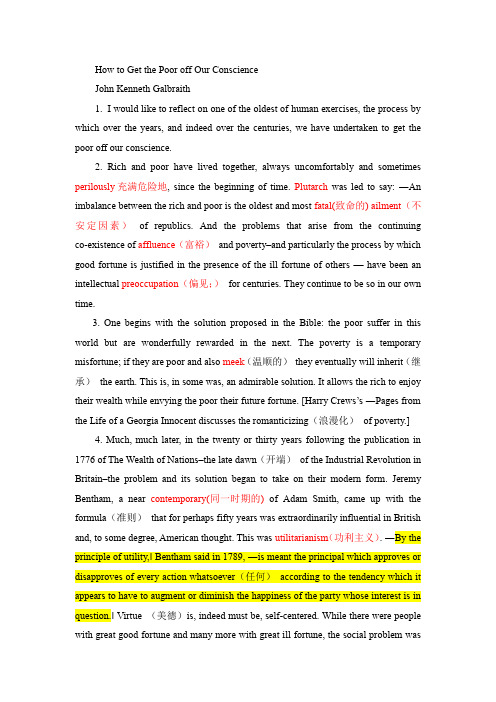
How to Get the Poor off Our ConscienceJohn Kenneth Galbraith1. I would like to reflect on one of the oldest of human exercises, the process by which over the years, and indeed over the centuries, we have undertaken to get the poor off our conscience.2. Rich and poor have lived together, always uncomfortably and sometimes perilously充满危险地, since the beginning of time. Plutarch was led to say: ―An imbalance between the rich and poor is the oldest and most fatal(致命的) ailment(不安定因素)of republics. And the problems that arise from the continuing co-existence of affluence(富裕)and poverty–and particularly the process by which good fortune is justified in the presence of the ill fortune of others — have been an intellectual preoccupation(偏见;)for centuries. They continue to be so in our own time.3. One begins with the solution proposed in the Bible: the poor suffer in this world but are wonderfully rewarded in the next. The poverty is a temporary misfortune; if they are poor and also meek(温顺的)they eventually will inherit(继承)the earth. This is, in some was, an admirable solution. It allows the rich to enjoy their wealth while envying the poor their future fortune. [Harry Crews’s ―Pages from the Life of a Georgia Innocent discusses the romanticizing(浪漫化)of poverty.]4. Much, much later, in the twenty or thirty years following the publication in 1776 of The Wealth of Nations–the late dawn(开端)of the Industrial Revolution in Britain–the problem and its solution began to take on their modern form. Jeremy Bentham, a near contemporary(同一时期的)of Adam Smith, came up with the formula(准则)that for perhaps fifty years was extraordinarily influential in British and, to some degree, American thought. This was utilitarianism(功利主义). ―By the principle of utility,‖Bentham said in 1789, ―is meant the principal which approves or disapproves of every action whatsoever(任何)according to the tendency which it appears to have to augment or diminish the happiness of the party whose interest is in question.‖ Virtue (美德)is, indeed must be, self-centered. While there were people with great good fortune and many more with great ill fortune, the social problem wassolved as long as, again in Bentham’s words, there was ―the greatest good for the greatest number. Society did its best for the largest possible number of people; one accepted that the result might be sadly unpleasant for the many whose happiness was not served.5. In the 1830’s a new formula, influential in no slight degree to this day, became available for getting the poor off the public conscience. This is associated with the names of David Ricardo, a stockbroker,(股票经纪人)and Thomas Robert Malthus, a divine(牧师). The essentials are familiar: the poverty of the poor was the fault of the poor.And it was so because it was a product of their excessive(过度的)fecundity(生育能力): their grievously(严重的)uncontrolled lust(性欲)caused them to breed up(生育)to the full limits of the available subsistence(生存).6. This was Malthusianism. Poverty being caused in the bed meant that the rich were not responsible for either its creation or its amelioration(改善). However, Malthus was himself not without a certain feeling of responsibility: he urged that the marriage ceremony contain a warning against undue(过度的)and irresponsible sexual intercourse(交合)–a warning, it is fair to say, that has not been accepted as a fully effective method of birth control. In more recent times, Ronald Reagan has said that the best form of population control emerges from the market. (Couples in love should repair to R. H. Macy’s, not their bedrooms.) Malthus, it must be said, was at least as relevant.7. By the middle of the nineteenth century, a new form of denial(否认)achieved great influence, especially in the United States. The new doctrine(声明、原则), associated with the name of Herbert Spencer, was Social Darwinism. In economic life, as in biological development, t he overriding(最重要的)rule was survival of the fittest. That phrase–‖survival of the fittest‖–came, in fact, not from Charles Darwin but from Spencer, and expressed his view of economic life. The elimination of the poor is nature’s way of improving the race. The weak and unfortunate being extruded(挤压出), the quality of the human family is thus strengthened.8. One of the most notable American spokespersons(代言人)of Social Darwinism was John D. Rockefeller–the first Rockefeller–who said in a famous speech: ―The American Beauty rose can be produced in the splendor (华丽)and fragrance(芬芳)which bring cheer to its beholder(旁观者)only by sacrificing the early buds(芽)which grow up around it. And so it is in economic life. It is merely the working out of a law of nature and a law of God.‖[Jacob Riis’s How the Other Half Lives was written during the time of Social Darwinism and played a major role in this ideology’s demise.]9. In the course of the present century, however, Social Darwinism came to be considered a bit too cruel. It declined in popularity, and references(引用)to it acquired a condemnatory(谴责的)tone. We passed on to the more amorphous(无组织的)denial (拒绝)of poverty associated with Calvin Coolidge and Herbert Hoover. They held that public assistance to the poor interfered with the effective operation of the economic system–that such assistance was inconsistent with the economic design that had come to serve most people very well. The notion that there is something economically damaging about helping the poor remains with us to this day as one of the ways by which we get them off our conscience. [It doesn’t follow, however, th at government aid to the affluent is morally damaging; see ―The Next New Deal and—Reining in the Rich.]10. With the Roosevelt revolution (as previously with that of Lloyd George in Britain), a specific responsibility was assumed by the government for the least fortunate people in the republic.Roosevelt and the presidents who followed him accepted a substantial measure of responsibility for the old through Social Security, for the unemployed through unemployment insurance, for the unemployable and the handicapped(残疾的)through direct relief, and for the sick through Medicare and Medicaid(公共医疗补助制). This was a truly great change, and for a time, the age-old tendency to avoid thinking about the poor gave way to the feeling that we didn’t need to try–that we were, indeed, doing something about them.11. In recent years, however, it has become clear that the search for a way ofgetting the poor off our conscience was not at an end; it was only suspended(暂停). And so we are now again engaged in this search in a highly energetic way. It has again become a major philosophical, literary, and rhetorical(夸张的)preoccupation, and an economically not unrewarding enterprise.12. Of the four, maybe five, current designs we have to get the poor off our conscience, the first proceeds from the inescapable(不可避免的)fact that most of the things that must be done on behalf of the poor must be done in one way or another by the government. It is then argued that the government is inherently(固有的)incompetent(无能的), except as regards weapons design and procurement(获得)and the overall management of the Pentagon(五角大楼). Being incompetent and ineffective, it must not be asked to succor(帮助)the poor; it will only louse(搞砸)things up or make things worse.13. The allegation(指责)of government incompetence is associated in our time with the general condemnation(谴责)of the bureaucrat(官僚主义)–again excluding those associated with national defense. The only form of discrimination that is still permissible–that is, still officially encouraged in the United States today–is discrimination against people who work for the federal government, especially on social welfare activities. We have great corporate bureaucracies replete with corporate bureaucrats, but they are good; only public bureaucracy and government servants are bad. In fact we have in the United States an extraordinarily good public service–one made up of talented and dedicated people who are overwhelmingly honest and only rarely given to overpaying for monkey wrenches, flashlights, coffee makers, and toilet seats. (When these aberrations have occurred they have, oddly enough, all been in the Pentagon.) We have nearly abolished poverty among the old, greatly democratized health care, assured minorities of their civil rights, and vastly enhanced educational opportunity. All this would seem a considerable achievement for incompetent and otherwise ineffective people. We must recognize that the present condemnation of government and government administration is really part of the continuing design for avoiding responsibility for the poor.14. The second design in this great centuries-old tradition is to a rgue that anyform of public help to the poor only hurts the poo r. It destroys morale. It seduces people away from gainful employment. It breaks up marriages, since women can seek welfare for themselves and their children once they are without husbands.15. There is no proof of this-none, certainly, that compares that damage with the damage that would be inflicted by the loss of public assistance. [See Robert Greenstein’s congressional testimony.] Still, the case is made–and believed–that there is something gravely damaging about aid to the unfortunate. This is perhaps our most highly influential piece of fiction.16. The third, and closely related, design for relieving ourselves of responsibility for the poor is the argument that public-assistance measures have an adverse effect on incentive. They transfer income from the diligent to the idle and feckless, thus reducing the effort of the diligent and encouraging the idleness of the idle. The modern manifestation of this is supply-side economics. Supply-side economics holds that the rich in the United States have not been working because they have too little income. So, by taking money from the poor and giving it to the rich, we increase effort and stimulate the economy. Can we really believe that any considerable number of the poor prefer welfare to a good job? Or that business people—corporate executives, the key figures in our time—are idling away their hours because of the insufficiency of their pay? This is a scandalous charge against the American businessperson, notably a hard worker. Belief can be the servant of truth–but even more of convenience.17. The fourth design for getting the poor off our conscience is to point to the presumed adverse effect on freedom of taking responsibility for them. Freedom consists of the right to spend a maximum of one’s money by one’s own choice, and to see a minimum taken and spent by the government. (Again, expenditure on national defense is excepted.) In the enduring words of Professor Milton Friedman, people must be ―free to choose.18. This is possibly the most transparent of all of the designs; no mention is ordinarily made of the relation of income to the freedom of the poor. (Professor Friedman is here an exception; through the negative income tax, he would assureeveryone a basic income.) There is, we can surely agree, no form of oppression that is quite so great, no construction on thought and effort quite so comprehensive, as that which comes from having no money at all. Though we hear much about the limitation on the freedom of the affluent when their income is reduced through taxes, we hear nothing of the extraordinary enhancement of the freedom of the poor from having some money of their own to spend. Yet the loss of freedom from taxation to the rich is a small thing as compared with the gain in freedom from providing some income to the impoverished. Freedom we rightly cherish. Cherishing it, we should not use it as a cover for denying freedom to those in need.19. Finally, when all else fails, we resort to simple psychological denial. This is a psychic tendency that in various manifestations is common to us all. It causes us to avoid thinking about death. It causes a great many people to avoid thought of the arms race and the consequent rush toward a highly probable extinction. By the same process of psychological denial, we decline to think of the poor. Whether they be in Ethiopia, the South Bronx, or even in such an Elysium as Los Angeles, we resolve to keep them off our minds. Think, we are often advised, of something pleasant.20. These are the modern designs by which we escape concern for the poor. All, save perhaps the last, are in great inventive descent from Bentham, Malthus, and Spencer. Ronald Reagan and his colleagues are clearly in a notable tradition–at the end of a lon g history of effort to escape responsibility for one’s fellow beings. So are the philosophers now celebrated in Washington: George Gilder, a greatly favored figure of the recent past, who tells to much applause that the poor must have the cruel spur of their own suffering to ensure effort; Charles Murray, who, to greater cheers, contemplates ―scrapping the entire federal welfare and income-support structure for working and aged persons, including A.F.D.C., Medicaid, food stamps, unemployment insurance, Work ers’ Compensation, subsidized housing, disability insurance, and, he adds, ―the rest. Cut the knot, for there is no way to untie it. By a triage, the worthy would be selected to survive; the loss of the rest is the penalty we should pay. Murray is the voice of Spencer in our time; he is enjoying, as indicated, unparalleled popularity in high Washington circles.21. Compassion, along with the associated public effort, is the least comfortable, the least convenient, course of behavior and action in our time. But it remains the only one that it compatible with a totally civilized life. Also, it is, in the end, the most truly conservative course. There is no paradox here. Civil discontent and its consequences do not come from contented people–an obvious point to the extent to which we can make contentment as nearly universal as possible, we will preserve and enlarge the social and political tranquillity for which conservatives, above all, should yearn.。
how to get the poor off our conscience
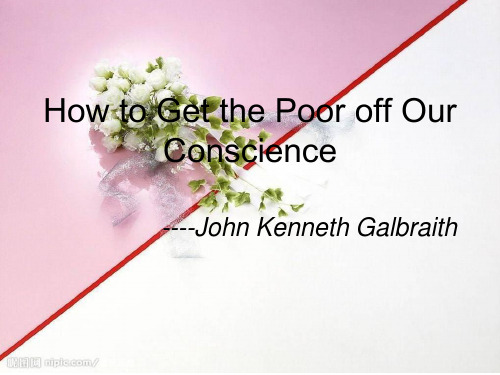
Part.4:current research
• Para12.:the first design • What is the argument of the first design? • The argument is:Most of the assistance to the poor has to be undertaken by the government,but the government is in essence incompetent and ineffective and will make a mess of the job.Therefore,the government should not be asked to aid the poor.
How to Get the Poor off Our Conscience
----John Kenneth Galbraith
Why the author choose such a title as this essay?
Why the author choose such a title as this essay?
• Para.7:the fourth solution—Social Darwinismsurvival of the fittest • “The elimination of the poor is nature’s way of improving the race.”
• Para.9:the fifth solution—more vague denial of poverty • “We passed on to the more amorphous denial of poverty ……serve most people very well.”
How to Get the Poor off Our Conscience教材
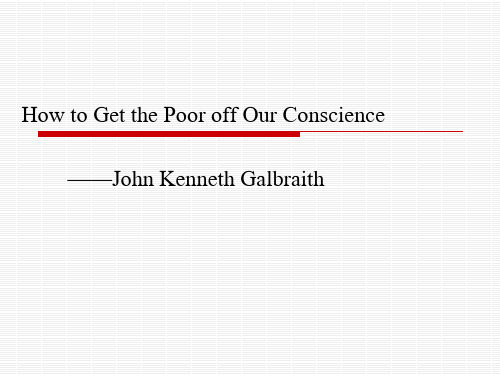
Amelioration: improvement or betterment,改善, 改良
Para: However, Malthus was himself not without a certain feeling of responsibility:….a fully effective method of birth control.
grieve:~ (for / over sb/sth) to feel very sad,
especially because sb has died: 使悲痛,使伤心
Subsistence: the state of having just enough money or food to stay alive: Many families are living below the level of subsistence. 生存,生计
Malthus urged that the marriage ceremony should contain a warning to people not to have excessive sexual intercourse and too many children. By “irresponsible”, Malthus meant that sexual intercourse should not be conducted out of lust,
Without thinking of consequences. Malthus hoped that in this way, birth control could be accomplished. But the author said that the warning had not been accepted. The author agreed that Malthus meant well but ironically implied that it was naïve to expect that humans would be convinced by the Malthusian argument.
How to get the poor off our conscience 原文翻译
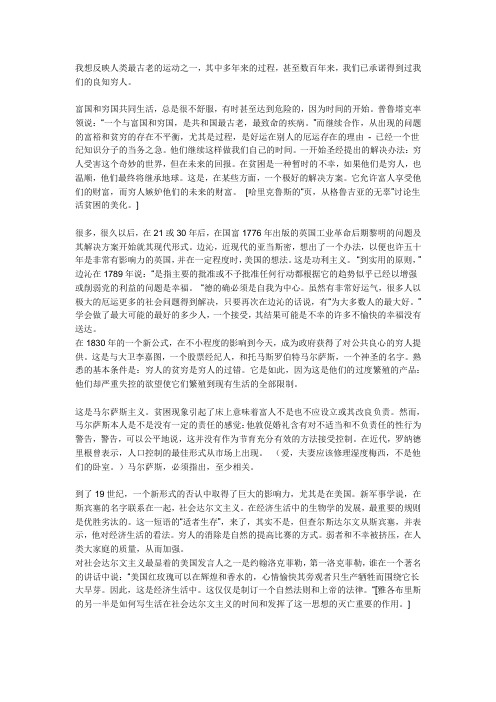
我想反映人类最古老的运动之一,其中多年来的过程,甚至数百年来,我们已承诺得到过我们的良知穷人。
富国和穷国共同生活,总是很不舒服,有时甚至达到危险的,因为时间的开始。
普鲁塔克率领说:“一个与富国和穷国,是共和国最古老,最致命的疾病。
”而继续合作,从出现的问题的富裕和贫穷的存在不平衡,尤其是过程,是好运在别人的厄运存在的理由- 已经一个世纪知识分子的当务之急。
他们继续这样做我们自己的时间。
一开始圣经提出的解决办法:穷人受害这个奇妙的世界,但在未来的回报。
在贫困是一种暂时的不幸,如果他们是穷人,也温顺,他们最终将继承地球。
这是,在某些方面,一个极好的解决方案。
它允许富人享受他们的财富,而穷人嫉妒他们的未来的财富。
[哈里克鲁斯的“页,从格鲁吉亚的无辜”讨论生活贫困的美化。
]很多,很久以后,在21或30年后,在国富1776年出版的英国工业革命后期黎明的问题及其解决方案开始就其现代形式。
边沁,近现代的亚当斯密,想出了一个办法,以便也许五十年是非常有影响力的英国,并在一定程度时,美国的想法。
这是功利主义。
“到实用的原则,”边沁在1789年说:“是指主要的批准或不予批准任何行动都根据它的趋势似乎已经以增强或削弱党的利益的问题是幸福。
“德的确必须是自我为中心。
虽然有非常好运气,很多人以极大的厄运更多的社会问题得到解决,只要再次在边沁的话说,有“为大多数人的最大好。
”学会做了最大可能的最好的多少人,一个接受,其结果可能是不幸的许多不愉快的幸福没有送达。
在1830年的一个新公式,在不小程度的影响到今天,成为政府获得了对公共良心的穷人提供。
这是与大卫李嘉图,一个股票经纪人,和托马斯罗伯特马尔萨斯,一个神圣的名字。
熟悉的基本条件是:穷人的贫穷是穷人的过错。
它是如此,因为这是他们的过度繁殖的产品:他们却严重失控的欲望使它们繁殖到现有生活的全部限制。
这是马尔萨斯主义。
贫困现象引起了床上意味着富人不是也不应设立或其改良负责。
然而,马尔萨斯本人是不是没有一定的责任的感觉:他敦促婚礼含有对不适当和不负责任的性行为警告,警告,可以公平地说,这并没有作为节育充分有效的方法接受控制。
Lesson 1 How to Get the Poor Off Our Conscience
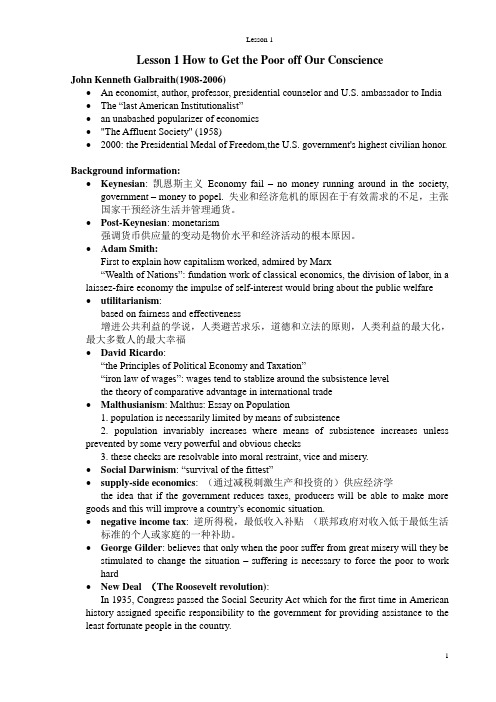
Lesson 1 How to Get the Poor off Our ConscienceJohn Kenneth Galbraith(1908-2006)•An economist, author, professor, presidential counselor and U.S. ambassador to India •The “last American Institutionalist”•an unabashed popularizer of economics•"The Affluent Society" (1958)•2000: the Presidential Medal of Freedom,the U.S. government's highest civilian honor. Background information:•Keynesian: 凯恩斯主义Economy fail –no money running around in the society, government – money to popel. 失业和经济危机的原因在于有效需求的不足,主张国家干预经济生活并管理通货。
•Post-Keynesian: monetarism强调货币供应量的变动是物价水平和经济活动的根本原因。
•Adam Smith:First to explain how capitalism worked, admired by Marx“Wealth of Nations”: fundation work of classical economics, the division of labor, in a laissez-faire economy the impulse of self-interest would bring about the public welfare •utilitarianism:based on fairness and effectiveness增进公共利益的学说,人类避苦求乐,道德和立法的原则,人类利益的最大化,最大多数人的最大幸福•David Ricardo:“the Principles of Political Economy and Taxation”“iron law of wages”: wages tend to stablize around the subsistence levelthe theory of comparative advantage in international trade•Malthusianism: Malthus: Essay on Population1. population is necessarily limited by means of subsistence2. population invariably increases where means of subsistence increases unlessprevented by some very powerful and obvious checks3. these checks are resolvable into moral restraint, vice and misery.•Social Darwinism: “survival of the fittest”•supply-side economics: (通过减税刺激生产和投资的)供应经济学the idea that if the government reduces taxes, producers will be able to make more goods and this will improve a country’s economic situation.•negative income tax: 逆所得税,最低收入补贴(联邦政府对收入低于最低生活标准的个人或家庭的一种补助。
现代大学英语精读6 Lesson 1 How to Get the Poor off Our Conscience
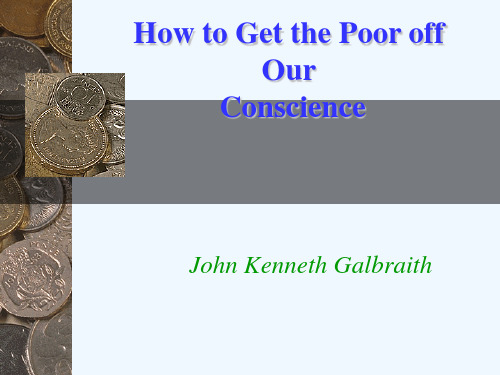
How to Get the Poor off Our
Conscience
John Kenneth Galbraith
John Kenneth Galbraith (1908-2006)
• A Canadian-American economist, author, professor, presidential counselor and U.S. ambassador to India
• awarded in 2000 with the Leontief Prize for his outstanding contribution to economic theory by the Global Development and Environment Institute.
• The library in his hometown Dutton, Ontario was renamed the John Kenneth Galbraith Reference Library in honor of his attachment to the library and his contributions to the new building.
• a frustrating half year
Political posts under Kennedy
• During his time as an adviser to President John F. Kennedy, Galbraith was appointed United States Ambassador to India from 1961 to 1963.
how-to-get-the-poor-off-our-conscience翻译+原文
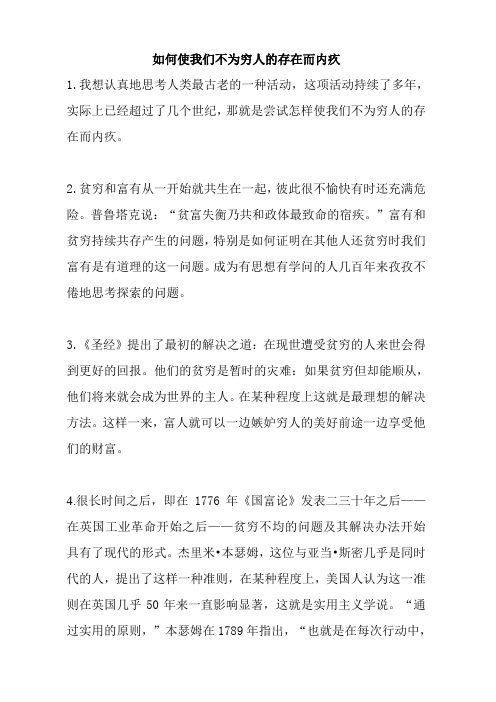
如何使我们不为穷人的存在而内疚1.我想认真地思考人类最古老的一种活动,这项活动持续了多年,实际上已经超过了几个世纪,那就是尝试怎样使我们不为穷人的存在而内疚。
2.贫穷和富有从一开始就共生在一起,彼此很不愉快有时还充满危险。
普鲁塔克说:“贫富失衡乃共和政体最致命的宿疾。
”富有和贫穷持续共存产生的问题,特别是如何证明在其他人还贫穷时我们富有是有道理的这一问题。
成为有思想有学问的人几百年来孜孜不倦地思考探索的问题。
3.《圣经》提出了最初的解决之道:在现世遭受贫穷的人来世会得到更好的回报。
他们的贫穷是暂时的灾难:如果贫穷但却能顺从,他们将来就会成为世界的主人。
在某种程度上这就是最理想的解决方法。
这样一来,富人就可以一边嫉妒穷人的美好前途一边享受他们的财富。
4.很长时间之后,即在1776年《国富论》发表二三十年之后——在英国工业革命开始之后——贫穷不均的问题及其解决办法开始具有了现代的形式。
杰里米•本瑟姆,这位与亚当•斯密几乎是同时代的人,提出了这样一种准则,在某种程度上,美国人认为这一准则在英国几乎50年来一直影响显著,这就是实用主义学说。
“通过实用的原则,”本瑟姆在1789年指出,“也就是在每次行动中,依照政党各方利益受影响的好坏趋势,来赞同刚或则否决该项行动的原则。
”实用,实际上一定是以自我为中心的。
然而,社会中只有少数人拥有大量财富,却有更多人没有财富。
只要遵循本瑟姆的——“最大的利益给最多的人”,就能够解决社会问题。
社会尽力满足更多人的利益,然而对于那些利益没有被满足的人来说,这个结果是悲哀的。
5.在19世纪30年代,一种新的准则成为使我们不为穷人的存在感到内疚的有效办法,迄今为止它的影响也丝毫没有减弱。
这是与股票家戴维•里卡多和托马斯•罗伯特•马尔萨斯神父联系在一起的。
它的本质很为人们所熟悉:穷人的贫穷是他们自己的错误。
贫穷是他们过度生育的结果。
很遗憾,他们不能控制性欲,过度生育把地球具有的养活人口的能力推向极限。
英文作者观点解析How to get the poor out of our conscience
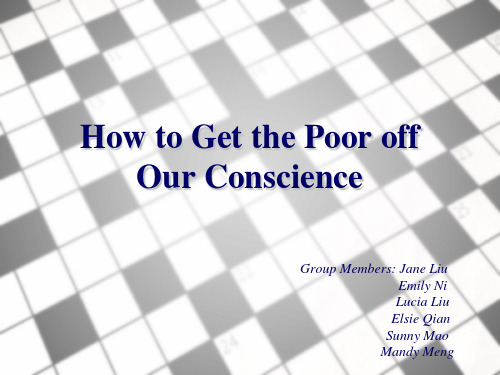
The author uses two rhetorical questions to counter the argument. He implies that it is not the case that most poor people would prefer welfare to paying job. As for corporate executives, they are working very hard, showing no sign of lack of incentive. To say they are being lazy because they are not paid enough is an insult to the business executives.
Thank You!
The fifth design: (Para.19) Psychological denial is a psychic tendency that in various manifestations is common to us all.
Author’s argument: We all have the tendency to close our eyes to unpleasant things or refuse to think about them. This tendency may take different forms.
Author’s argument: The author is being ironical when he uses the word “transparent”. He means it is the most obvious that when these people talk about freedom they only have in mind the freedom of the rich.
how to get the poor off our conscience课件

社会道德义务
社会有义务创造一个公平的环境,使每个人 都有机会获得基本的生活需求,如食物、住 所和教育。社会不公正会导致贫困的持续存 在。
对贫穷的同情与理解
了解贫穷的根源
要真正同情和理解贫穷,首先需 要了解其背后的原因。这包括贫 困的地理、社会、经济和政治因
素。
体验贫穷的困境
通过模拟贫穷生活的体验,人们 可以更好地理解贫穷的艰辛和挑 战。这有助于培养更深层次的同
开展公益活动
社会组织可以开展各种公益活动,如义卖、募捐、志愿服务等,筹 集资金和物资,帮助贫困人口改善生活。
倡导社会关注
社会组织应积极倡导社会各界关注贫困问题,提高公众对贫困问题 的认识和重视程度。
个人层面的行动与实践
参与志愿者活动
个人可以积极参与各种志 愿者活动,为贫困地区和 贫困人群提供帮助和服务 。
参与公益事业
个人可以参与公益事业,为消除贫困贡献自己的 力量。
呼吁全社会共同参与消除贫困
政府加大投入
政府应该加大对消除贫困的投入,制定更加有效的政策和措施。
企业承担社会责任
企业应该积极承担社会责任,为消除贫困提供资金和技术支持。
社会组织发挥积极作用
社会组织应该积极参与消除贫困的工作,推动社会公平和进步。
倡导社会公平正义
个人应该关注社会公平正义,支持政府和社会组织开展扶贫工作 ,推动社会进步和发展。
培养良好品德
个人应该具备同情心、关爱和尊重他人的品质,关注弱势群体的 需求和权益,为构建和谐社会做出贡献。
06
结语
对未来的展望与期待
贫困问题逐渐得到解决
随着社会的发展和政策的完善,贫困问题将逐渐得到缓解,更多 人将有机会摆脱贫困。
英语作文 议论文

How to Get the Poor Off Our Conscience1、①Bible: the poor suffer in this world but are wonderfully rewarded in the next.②Utilitarianism.③In the 1830's a new formula :the poverty of the poor was the fault of the poor.④Social Darwinism.⑤Public assistance to the poor interfered with the effective operation of the economic system. 2、①Most of the things that must be done on behalf of the poor must be done in one way or another by the government.②Any form of public help to the poor only hurts the poor.③Design for relieving ourselves of responsibility for the poor is the argument that public-assistance measures have an adverse effect on incentive.④To point to the presumed adverse effect on freedom of taking responsibility for them.⑤When all else fails, we resort to simple psychological denial.3、One of the oldest of human exercises, the process by which over the years, and indeed over the centuries, we have undertaken to get the poor off our conscience.4、An imbalance between the rich and poor.5、The problems that arise from the continuing co-existence of affluence and poverty.6、①The poor suffer in this world but are wonderfully rewarded in the next.②The poverty is a temporary misfortune; if they are poor and also meek they eventually will inherit the earth..③Yes, It allows the rich to enjoy their wealth while envying the poor their future fortune.7、The problem and solution of the Industrial Revolution in Britain.8、①Utilitarianism②The principal which approves or disapproves of every action whatsoever according to the tendency which it appears to have to augment or diminish the happiness of the party whose interest is in question.9、Because the formula is associated with the names of David Ricardo, a stockbroker, and Thomas Robert Malthus, a divine.10、①Poverty being caused in the bed meant that the rich were not responsible for either its creation or its amelioration.②A warning against undue and irresponsible sexual intercourse.③Because that has not been accepted as a fully effective method of birth control.11、No, because such an idea shows the true character of inhuman sympathy of capitalist society.12、Survival of the fittest.13、Public assistance to the poor interfered with the effective operation of the economic system.14、A specific responsibility was assumed by the government for the least fortunate people in the republic. He is for the revolution.15、Roosevelt and the presidents who followed him accepted a substantial measure of responsibility for the old through Social Security, for the unemployed through unemployment insurance, for the unemployable and the handicapped through direct relief, and for the sick through Medicare and Medicaid.16、The age-old tendency to avoid thinking about the poor gave way to the feeling that we didn't need to try.17、The government is inherently incompetent, except as regards weapons design and procurement and the overall management of the Pentagon.18、The first proceeds from the inescapable fact that most of the things that must be done on behalf of the poor must be done in one way or another by the government.19、The author disagreed with them. he thinks that the government and government administration should pay attention to the public not to focus on that.20、Irony. The present condemnation of government and government administration is really part of the continuing design for avoiding responsibility for the poor.21、We have nearly abolished poverty among the old, greatly democratized health care, assured minorities of their civil rights, and vastly enhanced educational opportunity.22、No, he doesn't. There is something gravely damaging about aid to the unfortunate.23、Public-assistance measures have an adverse effect on incentive. A considerable number of the poor prefer a good job to welfare.24、Professor Friedman is an exception; through the negative income tax, he would assure everyone a basic income.25、①no form of oppression that is quite so great, no construction on thought and effort quite so comprehensive, as that which comes from having no money at all. No mention is ordinarily made of the relation of income to the freedom of the poor. ③By making comparison between the rich and the poor.26、①The public. Yes, I think so. Because he uses a lot of ironical examples.27、Compassion, along with the associated public effort, is the least comfortable, the least convenient, course of behavior and action in our time. But it remains the only one that it compatible with a totally civilized life.28、To the extent to which we can make contentment as nearly universal as possible, we will preserve and enlarge the social and political tranquility for which conservatives, above all, should yearn.。
1 How to Get the Poor off Our Conscience

Lesson One How to Get the Poor off Our ConscienceJohn Kenneth Galbraith●ObjectivesStudents will be able to:1. grasp the main idea and the author‟s attitude toward the poor ( The author does not really want, as the title suggests, to get the poor off our conscience. Instead, he criticizes the continuous effort in history and by the present government to get the poor off people‟s conscience and calls on the attention and compassion of people, mainly the middle-class people, so as to solve the problem of the poverty.);2. identify the ironical tone conveyed in the essay and appreciate the lucid andpersuasive style of the author (the abundant use of irony and sarcastic remarks); 3. get themselves familiar with those famous persons and their major theoriesmentioned in the text;4. identify and compare cultural and ideological differences between the West and theEast as shown in the essay;5. master the key language points and grammatical structures in the text;6. conduct a series of reading, listening, speaking and writing activities related to thetheme of the unit.●Time allotment: The teaching plan is to be carried out with 6 periods.The Meaning of the Title:…Conscience‟ is not a new word to you. It refers to the sense of right and wrong and the urge to do right. Conscience is unique to us human beings and distinguishes men from animals. When we did something wrong, we would suffer from an ill conscience, we would feel guilty. …To get something off one‟s conscience‟ is a phrase, meaning …to ease the burden on one‟s conscience by finding excuse for or justifying the existence of something bad or wrong‟, …to try not to bother oneself for the existence of something unfair‟. To cite a simple example, you all have the experience of seeing beggars in street, right? Do you give them money every time? I guess many of you just pass them by without giving them anything. Then, do you feel guilty or at least unease when you do so? What do you do to comfort yourself? You might say to yourselves …I am a student and have no extra money.‟ Or …they beg because they don‟t want to work hard‟ or …they are not really poor. They are cheaters. Begging is only their way of making money.‟ Now, you feel better. That‟s the way you get the beggar off your conscience. Now, my question is: does this essay offer any solutions to getthe poor off our conscience? Does the author really think it right to get the poor off our conscience? Keep these two questions in mind and find out the answers in your reading.The General Structure:Part I (para.1 and 2) An Intellectual Preoccupation for centuriesPart II (Paras.3 to 9) Five Solutions Offered in HistoryPart III (Paras.10 and 11): a transition; the suspension of the questionPart IV (Paras.12 to 20) Five Current DesignsPart V (Para.21) The conclusionDetailed Study of the Text:Para.11. I would like to reflect on one of the oldest of human exercises…●reflect on sth: to think it over seriously, to contemplate sth..●I want to think seriously about one of the oldest practice of human beings…●The use of …we‟ and …our‟ here seems to indicate that he is included in the searchof ways of …getting the poor off our conscience‟. He is not preaching something.He is discussing a moral sin, of which he himself is guilty of. In this way, the author brings readers close to him.●What does the author want to reflect on?He wants to discuss how people have been trying not to feel guilty about the existence of the poor people, to justify the continuing existence of poverty. Para.22. Rich and poor have lived together, always uncomfortably and sometimesperilously, since the beginning of time●Perilous: dangerous, involving risk●Why perilously? What does this sentence remind you of?Do you recall all those uprisings, riots, rebels and strikes by slaves, peasants and workers along the history? The poor and the rich can never live in peace. There are always fights and bloods.3. Plutarch was led to say: “An imbalance between the rich and poor is the oldest and most fatal ailment of republics.”●Plutarch: see note 2 on page 9. A famous priest, moralist of Ancient Rome●The republic: here refers to the Roman Republic. Republic as a government formmeans a state in which the supreme power rests in all the citizens entitled to vote and is exercised by representatives elected, directly and indirectly, by them and responsible to them. The Roman Republic is the earliest republic state. However, only a small number of its residents were entitled as citizens. Therefore, the essence of the roman republic is still the ruling of a small group.●“was led to say” implies that the statement was not made subjectively. Rather, it isthe logical conclusion of his studies and analyses.●Fatal: deadly, cannot be cured●Ailment: a common and slight illness, often a chronic oneWhat‟s the purpose of this quotation?●The author uses the quotation to prove his points that poverty is a perpetualproblem from the beginning of time since the Roman republic already suffered the same problems 2,000 years ago.4. And the problems that arise from the continuing coexistence of affluence and poverty….have been an intellectual preoccupation for centuries.●intellectual: of, about or appealing to the intellects●intellectual preoccupation: a subject or problem interested and thoroughlystudied by the intellects such as those great economists, thinkers,philosophers mentioned in the text.●What‟s the main idea of this statement?The main idea is that for centuries those with high intellect have beensearching for explanations to justify the coexistence of the rich and poor.●Why have such problems been an intellectual preoccupation for centuries?Because like other fundamental questions such as …what the nature of human being is‟, those problems concerni ng the coexistence of affluence and poverty are both philosophical and moral in nature and thus tend to arouse the interest of intellects.5. They continue to be so in our own time.This sentence shifts from the history back to the present time.…they‟ refers to the problems. …So‟ refers to the fact that the problems are an intellectual preoccupation.Part II (Paras.3-9)Para.3 the solution offered in the Bible6.The poor suffer in this world but are wonderfully rewarded in the next.●This idea sounds familiar to us, right? It is the same in Buddhism.●In the next: after they die, when they go to the next world, i.e. heaven orparadise7.Their poverty is a temporary…..●meek: patient and mild, submissiveIn the Bible, meek is used in a positive sense. To be meek is a virtue ofbelievers. But here, the word is used ironically, meaning submissive.●inherit the earth: to dominate the earth, to become masters8.This is, in some way, an admirable solution. It allows the rich to enjoy their wealthwhile envying the poor their future fortune.●Why is this an admirable solution?Because in this way, the rich will not feel guilty and can happily enjoytheir present life while the poor will have something to look forward to ---their future fortune, and will meekly accept their current misery.●Does the author really think it an admirable solution? How do you know?No. He is being ironical here. He calls it “an admirable solution” because now the rich can “get the poor off their conscience”. We can know that from theauthor‟s stating that the rich will …envy the poor their future fortune”.Para.4 Solution offered by Bentham9.Jeremy Bentham, a near contemporary of Adam Smith, came up with theformula….●See note 3 and 4 on page 9 to learn about Adam Smith and Bentham●Came up with: put forward10.“By the principle of utility,” Bentham said in 1789, “is meant….●augment: to increase●diminish: to decrease, to reduce●What is meant by “the principle of utility” according to Bentham?The principle of utility means that an action is judged by whether it will increase or decrease the benefits of those who are affected by the action.11.Virtue is, indeed must be, self-centered.By right action, we mean it must help promote personal interest.12.How do we understand what Bentham referred to as “the greatest number”, “thelargest possible number of people”?He used them in a relative sense. That is to say, the solution would benefit more people. In this way he could get the poor off his conscience.Para.5 Solution offered by David Ricardo and Robert Malthus, known as Malthusianism.13.… influential in no slight degree to this day….●in no slight degree: double negation means confirmation, functions tostress.●Its influence has not diminished so far. / its influence continues today to aremarkable degree.14.This is associated with the names of ….●See note 6 and 7. I would like to say a few more about Robert Malthus. Weshould not be misled by the negative opinion of the author toward Malthus.Actually his Essay on Population is a quite enlightening. Our birth controlpolicy is formulated according to his theory.●Why does the author mention the professions of the two?A stockbroker is one who helps the investors to earn money by buying andselling shares, and who usually makes a lot of money; A divine is a memberof the Christian clergy, a priest perhaps. You can see that these two personshad very different background, yet they shared much similarity in thinking.This fact makes their formula sound ironical.15.The essentials are familiar: the poverty of the poor was the fault of the poor. Andit was because it was product of their excessive fecundity….●fecundity: the capability or fact of producing young or new plants●This sentence means: the poverty of the poor was caused by their havingtoo many children. (This sounds familiar. It reminds me of the sloganfound in countryside: “要想富,少生孩子多种树。
lesson 1 How to Get the Poor of Our Conscience

• Para1 • I would like to reflect on one of the oldest of human exercises… • 1) reflect on sth: to think it over seriously, to contemplate sth.. • 2) I want to think seriously about one of the oldest practice of human beings… • 3) The use of ‗we‘ and ‗our‘ here seems to indicate that he is included in the search of ways of ‗getting the poor off our conscience‘. He is not preaching something. He is discussing a moral sin, of which he himself is guilty of. In this way, the author brings readers close to him.
Lesson 1 How to Get the Poor off Our Conscience
John Kenneth Galbraith
John Kenneth Galbraith
John Kenneth Galbraith
John Kenneth Galbraith and his wife
How to Get the Poor off Our Conscience
• John Kenneth Galbraith (1908—2005)
• From the 1930s to the 1990s, Galbraith helped define the national political debate, influencing both the direction of the Democratic Party and the thinking of its leaders. • In the course of his career he undertook a number of government assignments, including the organization of price controls in World War II and speech writing for presidents Roosevelt, Kennedy and Johnson.
How-to-Get-the-Poor-off-Our-ConsciencePPT优秀课件

3
Organization of the text
• *Part I (Para. 1-2): opening part • *Part II (Para. 3-9): five solutions
及残疾人 • Direct relief 直接救济 • Medicare and medicaid 医疗照顾和医疗补助 • Steam trains gave way to electric trains soon
after the war. • Ice and snow should give way to warmer
5
Reflect
• (1) The moon reflects the sun’s rays. • (2) The low value of the dollar reflects
growing concern of Americans. • (3) Take some time to reflect on your
• The author’s writing style: lucidity and persuasiveness, skillful employment of humorous irony to bitter satire.
• Rhetorical device: irony. • Words and expressions: perilous, justify,
4
Part I (Para. 1-2)
How to Get the Poor off Our Conscience

How to Get the Poor off Our ConscienceJohn Kenneth Galbraith Guide to ReadingJohn Kenneth Galbraith is the Paul M. Warburg Professor of Economics, Emeritus 1, at Harvard University. He is internationally known for his development of Keynesian 2 and post-Keynesian economics 3as well as for his writing and his active involvement in American politics.In 1958 Galbraith published The Affluent Society , which challenged the myth of the U.S. economy’s reliance on the gross national product for its social stability, positing 4instead that consumer’s taste for 1荣誉退职(或退休)的,退休后保留头衔的an emeritus professor (=a professor emeritus)荣誉教授2 ['keinziən] 凯恩斯的、凯恩斯主义的:约翰·梅纳德·凯恩斯的经济理论的或与之有关的;尤指提倡政府通过财政项目来提高就业并刺激商业活动的理论;Keynes 凯恩斯,约翰·梅纳尔:(1883-1946) 英国经济学家,他认为严重的失业是由于消费需求的不足,可以通过一些政府资助项目来缓解。
他也提倡政府通过赤字开支来刺激经济活动3 The theoretical foundation of Post Keynesianeconomics is the principle of effective demand, that demand matters in the long as well as the short run, so that a competitive market economy has no natural or automatic tendency towards full employment.4 1. To affirm or assume the existence of; postulate.假定,断定:证实或假定…的存在;2. To put forward, as for consideration or study; suggest: 提出以供考虑或研究;建议等问题,合理利用管线敷设技术。
- 1、下载文档前请自行甄别文档内容的完整性,平台不提供额外的编辑、内容补充、找答案等附加服务。
- 2、"仅部分预览"的文档,不可在线预览部分如存在完整性等问题,可反馈申请退款(可完整预览的文档不适用该条件!)。
- 3、如文档侵犯您的权益,请联系客服反馈,我们会尽快为您处理(人工客服工作时间:9:00-18:30)。
4. “By the principle of utility”… “is meant the principle which …”: The normal word order should be: utilitarianism is meant the principle which proves … by the principle of utility. According to Bentham, the principle of utilitarianism means that an action is judged by whether it will increase or decrease the benefits of those who are affected by the action.
5. utilitarianism is a general philosophical idea like idealism. which means the greatest happiness of the greatest number. Utilitarianism is the moral doctrine that we should always act to produce the greatest possible balance of good over had for everyone affected by our action.
Para. 7: the forth solution (Social Darwinism -survival of the fittest)
Para. 9: the fifth solution (more vague denial of poverty)
1. It declined in popularity, and references to it acquired a condemnatory tone: People began to reject Social Darwinism because it seemed to glorify brutal force and oppose treasured values of sympathy, love and friendship. Therefore, when it was mentioned, it was usually the target of criticism.
Para. 4: The second solution (utilitarianism) 1. The Wealth of Nations by Adam Smith
It is symbolic that Adam Smith's masterpiece of economic analysis, The Wealth of Nations, was first published in 1776, the same year as the Declaration of Independence. He argued passionately in favor of free trade and the most eloquent-integrated description of the workings of a market economy, which continues to
Consequently, the greatest happiness of all constitutes the standard that determines whether an action is right or wrong. If they promote the greatest human welfare actions are right, if they do not actions are wrong.
6. Why the author chooses such a title as this essay?
Look at the following photos. Millions and millions of people are struggling for their survival, thousands and thousands of people die of hunger, cold and illness. While „Millennium Development Goals are to meet the needs of the world‟s poorest”, do you think the author really tries to call people to get the poor off their conscience?
II. Outline of the essay
Part 1 (para.1-2): The oldest project in “getting the poor off our conscience” Part 2 (para. 3-9): 5 historical solutions Part 3 (para. 10-11): a transition Part 4 (para.12-20): 5 current designs Part 5: (para 21): conclusion
12. However, Malthus was himself not without a certain responsibility: He urged that … as a fully effective method of birth control:
What warning did Malthus urge that the marriage ceremony should contain? Why?
Stockbroker: a person whose job is buying
and selling shares for those with money (investor).
A stockbroker can easily earn big money through the commission which depends on the amount of money the investor invests, while it is very hard for the investor to earn money in the stock market, because of the high risk.
Para. 5: the third solution (po is associated with the name of David Ricardo, a stockbroker, and Thomas Robert Malthus, a divine.
Para. (10-11):a transition
18. Why does the author call it a revolution?
Because it broke away from the traditional conception that the federal government was not responsible for social welfare. The Social Security Act of 1935 laid foundation for the current social welfare system of the United States. Readers can easily sense that the author is for the revolution.
Para. 6: Malthusianism (马尔塞斯人口论) 11. … the rich were not responsible for either its creation or its amelioration:
The rich were not to blame for the existence of poverty so they should not be asked to undertake the task of solving the problem.
6. And the problems that arise from the continuing … have been an intellectual preoccupation for centuries.: The main idea of this statement is that for centuries those with high intellect have been searching for explanations to justify the coexistence of the rich and poor.
“Plutarch was led to say” implies that it was the actual existence of the rich and poor or the logic of his analysis that made him come to such a conclusion: … If the Rome republic suffered from the same problems 2,000 years ago, it proves the author‟s point that poverty is a perpetual (permanent) problem.
Part 2:historical research para. 3 The first solution (next-life theory)
